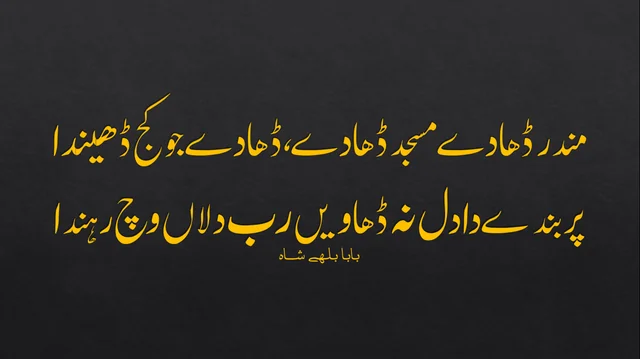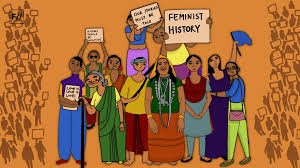Tariq Mahmood Awan
The poetry of Bulhe Shah is a remarkable expression of the mystic, social, cultural, political, religious, humane, sufi, and philosophical significance of his time and his vision. Bulhe Shah’s poetry is a reflection of his philosophy of Sufism, which can be seen as an indigenous philosophy of political activism and, class struggle and resistance to powerful institutions like religion and imperialism. Through his poems, he spoke against the “religious, political and social patriarchal high handedness” of his time. His mission to emphasize humanity, even at the risk of personal pain, has touched and inspired people to reflect on and spread his message of peace and love. He also used metaphors and symbols to convey his mystical experiences and his longing for union with the divine. For example, he often referred to himself as a bride waiting for her beloved or as a moth attracted to the flame. He also used the imagery of spinning and whirling, which is a common practice among Sufis, to express his ecstasy and surrender.
Bulle Shah’s poetry also addressed the social issues and problems of his time, such as caste discrimination, oppression of women, corruption, and violence. He challenged the rigid and hierarchical social structures and advocated for equality and justice for all. He also celebrated the diversity and pluralism of the society and embraced people from different backgrounds and faiths. He was especially fond of the low-caste and marginalized communities, such as the Chamars, the weavers, and the cobblers, and praised their skills and virtues. He also criticized the hypocrisy and arrogance of the high-caste and elite classes, such as the Brahmins, the Mullahs, and the Nawabs, and exposed their ignorance and greed.
Bulleh Shah’s poetry also contributed to the cultural development and enrichment of the Punjab region. He wrote in Punjabi, which was the language of the common people, and used the Kafi form, which is a popular style of Punjabi poetry. He also incorporated elements from the folk and classical traditions of the Punjab, such as the Baramah, the Shiarfi, the Oeodh, and the Gandhan. He also drew inspiration from the works of other famous Punjabi poets, such as Shah Hussain, Baba Farid, and Sultan Bahu. His poetry also influenced and inspired many other poets and artists, such as Muhammad Iqbal, Faiz Ahmad Faiz, Ali Arshad Mir, and Mian Muhammad Bakhsh.
Bulleh Shah’s poetry also reflected his political views and opinions, which were often critical and rebellious. He lived in a turbulent and chaotic time when the Mughal Empire was declining and the Sikh Confederacy was rising. He witnessed the wars, invasions, and massacres that plagued the land and the people. He also experienced the persecution and censorship of the orthodox religious authorities, who considered him a heretic and an apostate. He also faced the wrath and hostility of the feudal lords and the rulers, who saw him as a threat and a nuisance. He did not hesitate to voice his dissent and resistance against the tyranny and injustice of the powerful. He also expressed his hope and aspiration for a better and more peaceful world where people could live in harmony and freedom.
Please, subscribe to the monthly magazines of republicpolicy.com
Bulleh Shah’s poetry also revealed his religious beliefs and practices, which were based on the Sufi doctrine of love and devotion. He believed that the true religion was not in the outward forms and rituals but in the inward essence and spirit. He denounced the formal and superficial aspects of religion, such as the mosque, the temple, the idol, the rosary, and the scriptures, and emphasized the importance of the heart, the soul, the faith, and the love. He also rejected the sectarian and dogmatic divisions of religion, such as the Hindu, the Muslim, the Shia, and the Sunni, and advocated for the universal and inclusive religion of humanity. He also respected and revered the prophets and saints of all religions, such as Ram, Krishna, Muhammad SAW, Ali RA, and Guru Nanak, and considered them as his guides and friends.
Bulleh Shah’s poetry also demonstrates his humane and compassionate nature, which is evident in his concern and care for the suffering and the oppressed. He empathized with the pain and sorrow of the people and tried to console and comfort them. He also encouraged and motivated people to overcome their fears and doubts and to pursue their dreams and goals. He also shared his own joys and sorrows, his successes and failures, his hopes and regrets, and his love and loss with the people and made them feel that they were not alone. He also showed his gratitude and appreciation for the blessings and gifts of life and his humility and repentance for his mistakes and sins.
Bulleh Shah’s poetry also manifested his Sufi identity and affiliation, which was based on the Qadri and Shattari orders. He was a disciple of Shah Inayat Qadiri, a renowned Sufi master of Lahore, who taught him the secrets and mysteries of the Sufi path. He followed the teachings and practices of his master, such as the dhikr, the muraqaba, the sama, and the whirling. He also adopted the Sufi values and ethics, such as the tawhid, the sharia, the tariqa, the haqiqa, and the ma’rifa. He also acknowledged and respected the Sufi hierarchy and lineage, such as the abdal, the al-insan al-kamil, the baqaa, the fakir, the fana, the hal, the haqiqa, the ihsan, the irfan, the ishq, the karamat, the kashf, the lataif, the manzil, the ma’rifa, the maqam, the murid, the murshid, the nafs, the nur, the qalandar, the qutb, the silsila, the sufi cosmology, the sufi metaphysics, the sufi philosophy, the sufi poetry, the sufi psychology, the salik, the tazkiah, the wali, and the yaqeen.
Bulleh Shah’s poetry also conveyed his philosophical thoughts and insights, which were based on his rational and critical thinking. He questioned and challenged the established and conventional wisdom and authority and sought to find his own answers and solutions. He also explored and examined the various aspects and dimensions of life and reality, such as the self, the other, the world, the nature, the society, the culture, the history, the science, the art, the logic, the ethics, the aesthetics, the epistemology, the ontology, the metaphysics, the cosmology, the psychology, the sociology, the anthropology, the politics, the economics, the religion, the spirituality, and the mysticism. He also expressed and articulated his views and opinions on these topics in a clear and concise manner, using simple and accessible language and style.
These are some of the aspects of the poetry of Bulhe Shah that show its mystic, social, cultural, political, religious, humane, sufi, and philosophical significance. His poetry is a treasure of wisdom and knowledge, a source of inspiration and guidance, and a legacy of love and peace. His poetry is not only relevant and important for his time and place, but also for the present and future generations of the world. Hence, his poetry contains universal appeal and is relevant to human emotions, feelings and sentiments.
Please, subscribe to the monthly magazines of republicpolicy.com
















